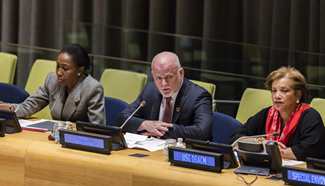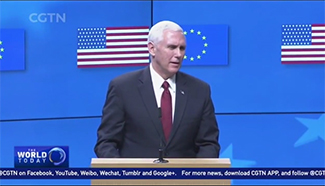SAN FRANCISCO, Feb. 19 (Xinhua) -- A leading marine ecologist on Sunday called for incentive-based solutions "to use the ocean without using it up," so as to achieve the long-term potential of blue growth.
Jane Lubchenco, a professor from College of Science in Oregon State University (OSU), shared her thoughts at the annual meeting of the American Association for the Advancement of Science (AAAS) as nations look to the ocean for new economic opportunities, food security or poverty alleviation.
At the AAAS event, taking place Thursday through Monday in Boston, Massachusetts, Lubchenco and Elizabeth Cerny-Chipman, a former postdoctoral scholar under Lubchenco and now a Knauss Fellow at the U.S. National Oceanic and Atmospheric Administration (NOAA), delivered their presentation entitled "Getting Incentives Right for Sustained Blue Growth: Science and Opportunities."
Saying that achieving blue growth will require aligning short- and long-term economic incentives to achieve a diverse mix of benefits, Lubchenco and her collaborators noted that the world's oceans are the main source of protein production for 3 billion people; are directly or indirectly responsible for the employment of more than 200 million people; and contribute 270 billion U.S. dollars to the planet's gross domestic product.
Blue growth refers to long-term strategies for supporting sustainable growth in the marine and maritime sectors as a whole.
"If we harness human ingenuity and recognize that a healthy ocean is essential for long-term prosperity, we can tackle the enormous threats facing the ocean," Lubchenco was quoted as saying in a news release, "and we can make a transition from vicious cycles to virtuous cycles."
"Some nations, like the Seychelles, Belize and South Africa, are doing integrated, smart planning to deconflict use by different sectors while also growing their economies in ways that value the health of the ocean, which is essential to jobs and food security. They are figuring out how to be smarter about ocean uses, not just to use the ocean more intensively."
The first step in building increased support for sustainable blue growth, Lubchenco said, is highlighting its potential. That means working with decision-makers to promote win-win solutions with clear short-term environmental and economic benefits. Governments, industry and communities all have important roles to play.
"Another key step is transforming the social norms that drive the behavior of the different actors, particularly in industry ... Finally, it will be critical to take a cross-sector approach," she noted.
"The right incentives can drive behavior that aligns with both desired environmental outcomes and desirable social outcomes," she added.












